By Shopify Writer: Tucker Schreiber > Entrepreneurship
9 minute read
Working from home is something we've all dreamed of.
You know, being able to work your own hours, wear pajamas all day while enjoying the freedom of doing what you want, when you want.
While all of that sounds incredible, it can be hard to stay productive with all the different distractions at home.
That's why we wrote this post. We'll go over some simple ways you can be more productive while working from home.
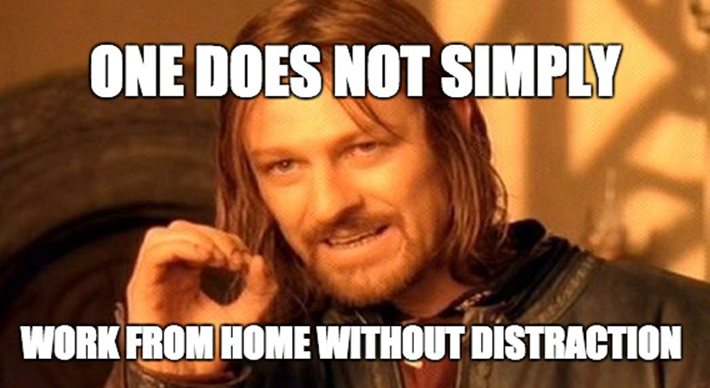
So you’ve made the decision to work from home. Whether that be an opportunity to work on a new business project of yours, or maybe you’re just fortunate enough to enjoy the ability to work where you want due to your career—working from home is an incredible experience.
But that doesn't mean it's as easy and fun as everyone thinks.
It takes a lot of discipline to be able to work from home. With constant distractions, chores, and simply getting caught up in daily requirements, it can be hard to stay focused and productive.
Working from home will look different for everyone, so the most important part is understanding what works for you may not work for someone else.
But with the help of these tips and tricks, you’ll have a much better grasp on working from home—and how to do it comfortably and productively.

Okay so you might not be the tidiest person in the world, and that’s fine. Perhaps your home office has always been a clutter of books, sketches, notes, and external hard drives scattered across your desk.
To some, that might sound like total chaos and a living nightmare. But, to others—that’s when they’re most productive.
Take this famous quote from Albert Einstein for instance and you might feel better about working in a cluttered workspace:
For me, I need everything to be organized. A cluttered desk for me is a reflection of a cluttered and anxious mind. I know I'm not productive in that sort of environment.
But how do you work best? Do you need clutter? Is there organization behind your clutter?
There’s no right or wrong answer here. But it’s certainly worth trying different working environments every once and a while to see what works best for you.
With that in mind, let’s get into some of the different ways you can stay productive while working from home—no matter what type of worker you are.

I’ve been in this situation before. It’s a vicious cycle. Blending your workspace with your personal space is not a good way to stay productive.
Sure, the idea of watching Netflix while working is great if you have some downtime—but it actually decreases your productivity tremendously. And, when these two worlds start to blend into one—it can be difficult to allocate time to one or the other.
Worst of all, it’s hard to “leave something at work” if you’ve had a rough day. I once tried working from my bedroom when I was working from home, and after a long day—not being able to "leave work" was a terrible feeling.
Here’s what you can do though: make a distinct boundary (either physically, or mentally) between your workspace and personal enjoyment space. Whether that be formed around allocating specific time slots in your day to working hours or even keeping any distractions out of arm's length—either thing should help.
It may be difficult at first to remove yourself from situations that may arise at home—but it's well worth it. If you have the opportunity, try taking a spare bedroom and turn it into your office rather than working from your couch.
Consider this: look into purchasing a room divider if your workspace isn't a separate room from where you should be spending your personal time.
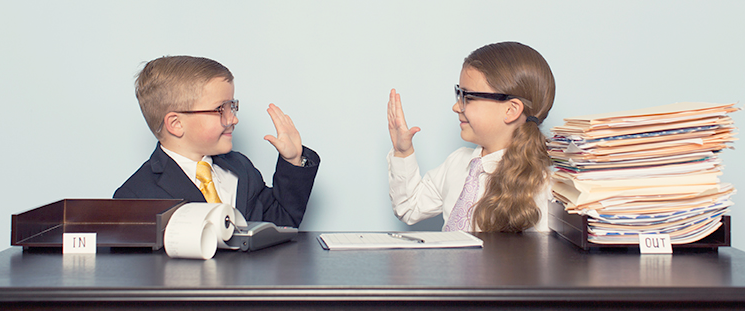
You’ve determined that you’re one of those people who just loves clutter. But have you considered trying to organize it?
Think of it like this—you have a lot of stuff. Books, notes, notebooks, pencils, pens—they’re all over the place. Even your desktop on your computer is cluttered with old screenshots, word documents and more.
You do know where everything is (most of the time)—but it's just not a very pleasant working environment for you, or even for those around you at home.
However, what about those things that you can never find? Do you know how much time you're wasting looking for that darn document when you could be working on your business?
Here are a few steps to take if you think it's time to declutter.
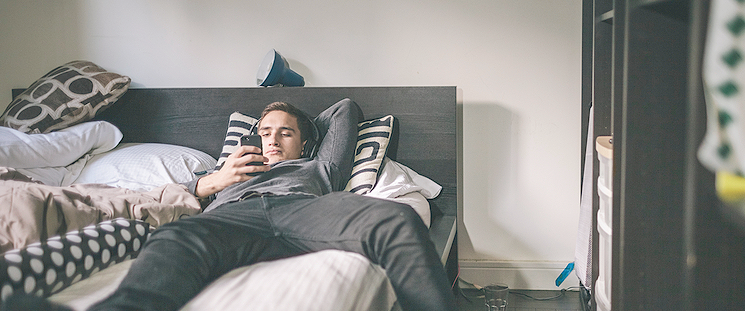
In the past we’ve discussed the importance of a morning ritual and how it can increase your daily productivity—but what about when you’re working from home?
It can be tempting to spend your day sitting around in your pajamas, drinking coffee, and eating junk food—but that’s not healthy for your mind or body.
Take some time to wake up early and actually get dressed. Dress as if you were heading to a meeting, or if you were working in an office.
It really does put you in a different mindset for your day.
An experiment by the team at A Life of Productivity found the following when looking into what sort of attire meant a higher level of productivity:
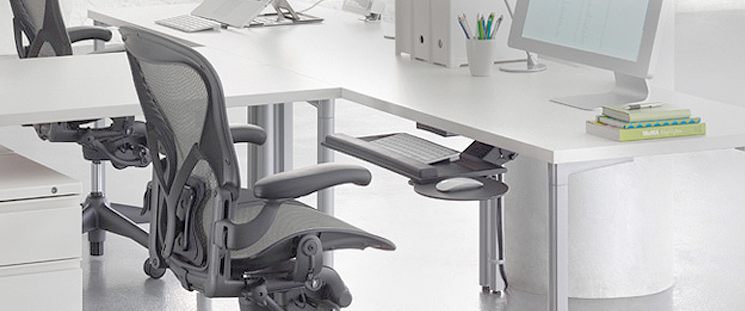
You might get up a few times for a break, but you may find yourself sitting down at your desk for hours on end once you get into a groove.
That’s why it’s important to invest in ergonomic furniture for your office. You can’t afford to have your productivity and health hindered by a poor workspace.
If you can, try and get an ergonomic chair or even a standing desk. Standing for a few hours while working will save your back, and will make you more productive.
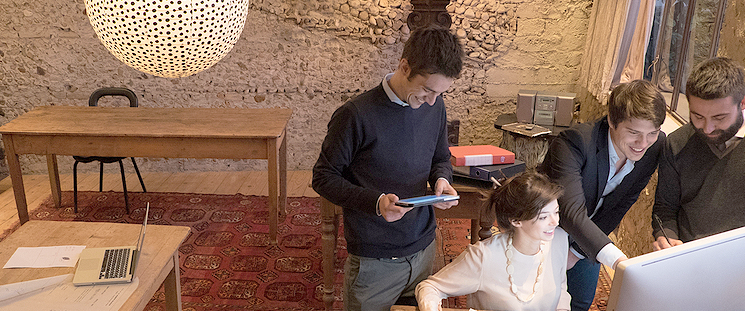
Some days working from home just doesn't feel right. It's good to take a break from your home office and get outside.
Luckily, you have the freedom to work where you want.
Consider working from a library, coffee shop or even rent a co-working space to work from for a day or two. It will help you reevaluate your efforts, and will give your mind a break from life at home.
If you can, try working from somewhere that has a lot of natural light. A study from Psychology Today found that exposure to natural light increases workspace productivity tremendously.
Plus, if you do end up working in an official coworking space (something besides a coffee shop or library) —chances are you'll sit beside someone who's able to help you out, and vice versa.

Usually if you're working from home, you'll have to take time out of your work day to cook for yourself. Or, if you're lucky—you might have someone working from home with you that can help with cooking.
To avoid spending too much time in the kitchen when you should be working, try doing some advance mealprep on Sunday evening. The idea here is to cook something in large quantities, throw them in tupperware and just eat it throughout the week so you don't waste time cooking during working hours.
Bodybuilders and athletes have been doing this for years. So why shouldn't entrepreneurs?
Tim Ferriss outlines what UFC champion GSP has done in the past.
In 2009, when the GSP experiment began, Jen had the entire professional kitchen of Bice to herself in the morning and prepared 3 meals for Georges during that time: a post-workout meal (that could be eaten cold, so he could have it directly after his workout), a dinner meal, and a breakfast meal for the next morning. Meal prep took between 2-4 hours.
You probably don't eat as much as GSP does, so it may take you even less than 2-4 hours. Give it a shot!
Consider this: take a look at this guide from DailyBurn that includes some meal prep ideas.
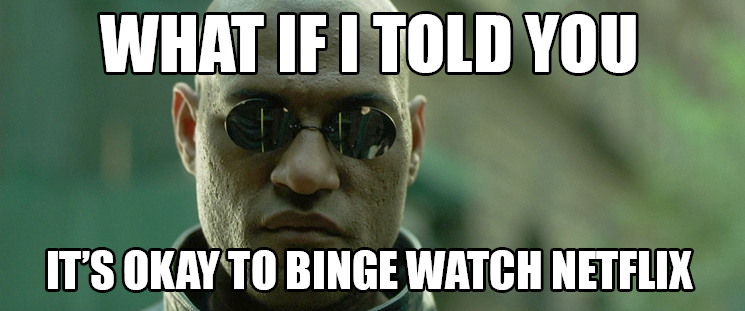
Working long, late hours may seem noble when hearing about entrepreneurs who worked hours on end to achieve their goal—but, part of what you often don’t hear is that they do take time for themselves.
They know when to turn off. They know when to unplug.
It’s important to know that it’s okay for you to take a break. It’s okay for you to watch T.V. for a few hours. It’s okay to do what you want, when you want when you feel as though you deserve it.
Just make sure it's after you've done your work for the day. An easy way to signal the end of a day is by writing in a journal. A productivity journal, like the 10x Journal for Entrepreneurs, has a space dedicated the end-of-day reflections, where you document what you achieved that day and set out your goals for the following day. By filling this our every evening, you can conclude the end of your work day with a productive activity.
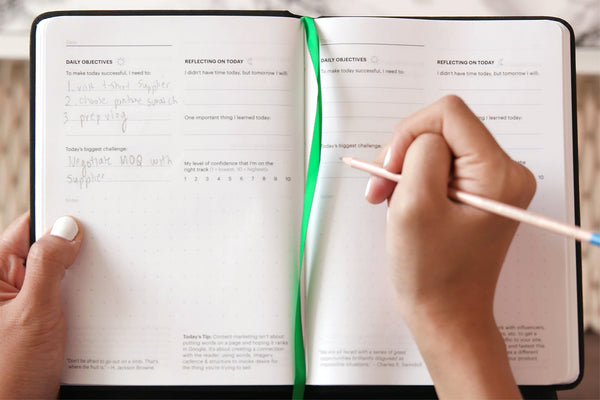
Let us know in the comments below if these work for you, or if you have any other tips for readers!
9 minute read
Working from home is something we've all dreamed of.
You know, being able to work your own hours, wear pajamas all day while enjoying the freedom of doing what you want, when you want.
While all of that sounds incredible, it can be hard to stay productive with all the different distractions at home.
How can you stay focused when your cute new cat is rubbing up against
you just begging to be cuddled? How can you stay productive when in the
back of your mind, a pile of dishes has been growing in your kitchen?
The Importance of a Productive Home Office

So you’ve made the decision to work from home. Whether that be an opportunity to work on a new business project of yours, or maybe you’re just fortunate enough to enjoy the ability to work where you want due to your career—working from home is an incredible experience.
But that doesn't mean it's as easy and fun as everyone thinks.
It takes a lot of discipline to be able to work from home. With constant distractions, chores, and simply getting caught up in daily requirements, it can be hard to stay focused and productive.
Working from home will look different for everyone, so the most important part is understanding what works for you may not work for someone else.
But with the help of these tips and tricks, you’ll have a much better grasp on working from home—and how to do it comfortably and productively.
How do you work best?

Okay so you might not be the tidiest person in the world, and that’s fine. Perhaps your home office has always been a clutter of books, sketches, notes, and external hard drives scattered across your desk.
To some, that might sound like total chaos and a living nightmare. But, to others—that’s when they’re most productive.
Take this famous quote from Albert Einstein for instance and you might feel better about working in a cluttered workspace:
If a cluttered desk is a sign of a cluttered mind, of what, then, is an empty desk a sign?It’s important to find out for yourself what makes you productive. What sort of environment do you work best in?
Albert Einstein
For me, I need everything to be organized. A cluttered desk for me is a reflection of a cluttered and anxious mind. I know I'm not productive in that sort of environment.
But how do you work best? Do you need clutter? Is there organization behind your clutter?
There’s no right or wrong answer here. But it’s certainly worth trying different working environments every once and a while to see what works best for you.
With that in mind, let’s get into some of the different ways you can stay productive while working from home—no matter what type of worker you are.
1. Keep Your Workspace and Personal Space Separate

I’ve been in this situation before. It’s a vicious cycle. Blending your workspace with your personal space is not a good way to stay productive.
Sure, the idea of watching Netflix while working is great if you have some downtime—but it actually decreases your productivity tremendously. And, when these two worlds start to blend into one—it can be difficult to allocate time to one or the other.
Worst of all, it’s hard to “leave something at work” if you’ve had a rough day. I once tried working from my bedroom when I was working from home, and after a long day—not being able to "leave work" was a terrible feeling.
One study featured in The Globe and Mail asked Canadian business professionals about their biggest distractions when working from home.
Here are the top five answers:
Sound familiar? You’ve probably had to deal with one of those things at some point while working from home.Here are the top five answers:
- Children and family wanting attention
- Inability to access proper office equipment
- The desire to complete household chores
- The temptation to keep TV on as ‘company’
- Lack of proper work space
Here’s what you can do though: make a distinct boundary (either physically, or mentally) between your workspace and personal enjoyment space. Whether that be formed around allocating specific time slots in your day to working hours or even keeping any distractions out of arm's length—either thing should help.
It may be difficult at first to remove yourself from situations that may arise at home—but it's well worth it. If you have the opportunity, try taking a spare bedroom and turn it into your office rather than working from your couch.
Consider this: look into purchasing a room divider if your workspace isn't a separate room from where you should be spending your personal time.
2. Try Organizing Your Clutter to Save Time

You’ve determined that you’re one of those people who just loves clutter. But have you considered trying to organize it?
Think of it like this—you have a lot of stuff. Books, notes, notebooks, pencils, pens—they’re all over the place. Even your desktop on your computer is cluttered with old screenshots, word documents and more.
You do know where everything is (most of the time)—but it's just not a very pleasant working environment for you, or even for those around you at home.
However, what about those things that you can never find? Do you know how much time you're wasting looking for that darn document when you could be working on your business?
Here are a few steps to take if you think it's time to declutter.
- Do a paper purge. Find any receipts, notes, papers—whatever you have laying around and consider even just throwing them in a box.
- Find a home for your pens, pencils and whatever tools you have on your desk.
- Do a weekly desktop purge—delete any files that are distracting or you no longer use and be sure to empty your computer trash bin.
- Throw stuff out. If you have old bottles of Mountain Dew on your desk, or traces of coffee grinds everywhere—just throw it out.
3. Get Dressed for Success

In the past we’ve discussed the importance of a morning ritual and how it can increase your daily productivity—but what about when you’re working from home?
It can be tempting to spend your day sitting around in your pajamas, drinking coffee, and eating junk food—but that’s not healthy for your mind or body.
Take some time to wake up early and actually get dressed. Dress as if you were heading to a meeting, or if you were working in an office.
It really does put you in a different mindset for your day.
An experiment by the team at A Life of Productivity found the following when looking into what sort of attire meant a higher level of productivity:
- Clothes are symbolic, and hugely affect how you feel about yourself. People have the tendency to surround themselves with objects that solidify the way they feel about themselves. Clothes are definitely no exception to that rule.
- The more time you put in your appearance, the more you’re motivated to ‘get out there’. This is particularly helpful when interacting with more people will make you more productive, like at a networking event or a party.
- You can compartmentalize your work life by changing your clothes when you get home. This helps you separate your work and home lives, particularly as more and more businesses adopt casual dress codes.
4. Invest in Ergonomic and Beautiful Furniture

You might get up a few times for a break, but you may find yourself sitting down at your desk for hours on end once you get into a groove.
That’s why it’s important to invest in ergonomic furniture for your office. You can’t afford to have your productivity and health hindered by a poor workspace.
If you can, try and get an ergonomic chair or even a standing desk. Standing for a few hours while working will save your back, and will make you more productive.
Don't think it's worth it to invest in a good chair? Think again. The team at Ergonomics Plus found that:
Consider this: just do a quick search on your favourite online furniture store to find an ergonomic solution that works best for you.- Ergonomics improves productivity. The best ergonomic solutions will often improve productivity. By designing a job to allow for good posture, less exertion, fewer motions and better heights and reaches, the workstation becomes more efficient.
- Ergonomics improves quality. Poor ergonomics leads to frustrated and fatigued workers that don’t do their best work. When the job task is too physically taxing on the worker, they may not perform their job like they were trained. For example, an employee might not fasten a screw tight enough due to a high force requirement which could create a product quality issue.
5. Consider Working from a Coworking Space

Some days working from home just doesn't feel right. It's good to take a break from your home office and get outside.
Luckily, you have the freedom to work where you want.
Consider working from a library, coffee shop or even rent a co-working space to work from for a day or two. It will help you reevaluate your efforts, and will give your mind a break from life at home.
If you can, try working from somewhere that has a lot of natural light. A study from Psychology Today found that exposure to natural light increases workspace productivity tremendously.
Plus, if you do end up working in an official coworking space (something besides a coffee shop or library) —chances are you'll sit beside someone who's able to help you out, and vice versa.
6. Meal Prep in Advance for The Week Ahead

Usually if you're working from home, you'll have to take time out of your work day to cook for yourself. Or, if you're lucky—you might have someone working from home with you that can help with cooking.
To avoid spending too much time in the kitchen when you should be working, try doing some advance mealprep on Sunday evening. The idea here is to cook something in large quantities, throw them in tupperware and just eat it throughout the week so you don't waste time cooking during working hours.
Bodybuilders and athletes have been doing this for years. So why shouldn't entrepreneurs?
Tim Ferriss outlines what UFC champion GSP has done in the past.
In 2009, when the GSP experiment began, Jen had the entire professional kitchen of Bice to herself in the morning and prepared 3 meals for Georges during that time: a post-workout meal (that could be eaten cold, so he could have it directly after his workout), a dinner meal, and a breakfast meal for the next morning. Meal prep took between 2-4 hours.
You probably don't eat as much as GSP does, so it may take you even less than 2-4 hours. Give it a shot!
Consider this: take a look at this guide from DailyBurn that includes some meal prep ideas.
7. Most Importantly, Know When to Stop Working

Working long, late hours may seem noble when hearing about entrepreneurs who worked hours on end to achieve their goal—but, part of what you often don’t hear is that they do take time for themselves.
They know when to turn off. They know when to unplug.
It’s important to know that it’s okay for you to take a break. It’s okay for you to watch T.V. for a few hours. It’s okay to do what you want, when you want when you feel as though you deserve it.
The team over at Becoming Minamalist found some compelling reasons as to why it's important to unplug.
So go ahead, binge watch that new favourite Netflix show. Go for a run or a walk. Whatever you'd like!- Powering-down helps remove unhealthy feelings of jealousy, envy, and loneliness.
- Powering-down combats the fear of missing out.
- Life, at its best, is happening right in front of you.
- Powering-down promotes creation over consumption.
Just make sure it's after you've done your work for the day. An easy way to signal the end of a day is by writing in a journal. A productivity journal, like the 10x Journal for Entrepreneurs, has a space dedicated the end-of-day reflections, where you document what you achieved that day and set out your goals for the following day. By filling this our every evening, you can conclude the end of your work day with a productive activity.

Conclusion
Now that we've taken a look at seven ways to work from home while staying productive, it's important that you actually put these into practice. If you're interested, we also have some work from home job openings. It may take some time to adjust to these different ways of working, but it really does pay off in the long run.Let us know in the comments below if these work for you, or if you have any other tips for readers!
Ready to put what you've learned into action? Build your own online store with Shopify! Don't forget to check in with our 24-7 customer service always available to assist!
Are you already a high-volume, fast-growing merchant?
We have the experts to assist with online store and e-Commerce set-up, design, development, apps, marketing and photography.
Advance your business for a fraction of traditional Enterprise costs with Shopify-Plus.
Whether you sell
online, on social media, in store, internationally
or out of the trunk of your car,
Shopify has you covered.
or out of the trunk of your car,
Shopify has you covered.


Comments
Post a Comment